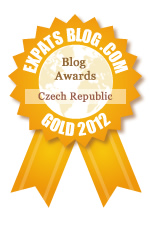There are all sorts of rules when it comes to names in Czech Republic. Each day of the year has a particular name assigned to it and people celebrate their svátek (name day). It's almost like a second birthday. On your name day, you normally receive flowers and you are supposed to give out sweets to your friends.
For example, my name day is September 18th so everyone in the country named Kryštof celebrates on this day. Everyone seems to know when it is someone's name day. Names are preprinted on almost every calendar here. Plus, florists write on the shop windows the name of the day so you know if you need to pick up some flowers on your way in to the office.
The name day calendar goes back to the 18th century and it really doesn't get updated that much. If your name isn't on the calendar then you don't get a name day. This helps explain why there isn't a whole lot of diversity in Czech names.
 |
| Official Czech Baby Name Book |
Here are some of the most common Czech names. (By no way a complete list)
Boys: Dalibor, Ivo, Jakub,
Jan, Jíří, Luboš, Luděk, Lukáš,
Martin, Michal, Ondřej, Pavel, Petr, Roman,
Tomáš, Vojtěch
Girls: Alžběta, Anna, Eva, Hana,
Jana, Kateřina, Jitka,
Lenka, Markéta,
Martina, Petra, Pavla, Šárka, Zdeňka
Then there are the short names. In English, William is often called Will or Bill. Depending on William's age and the level of intimacy, he could even be called Willy or Billy. It's kind of like that over here but with way more shades of gray.
Jan can be called Honza, Honzík, Honzíček, Jenda, Jeník, Jeníček, Jeňa or Janek. Anna can be called Anka, Aníčka, Andulka, Andula, Anča, Anínka, Anína or Anuška.
Under communism, parents had to receive special permission to give a child a name that wasn't already on the Czech calendar.
Not that much has changed. Authorities make things difficult if the child's name isn't on the official list. Since 1989, parents can name their child whatever they want as long as the name already exists somewhere in the world. And it must be approved by a special office in
Prague which charges a service fee.
Czechs don't have middle names. On all of my official papers here, I have to use my first name and middle name as the Czech first name just so that my documents all match my passport.
Czechs have a given name and a family name. However, the family name is different for women. Because the Czech language is dang complicated, last names are treated as adjectives and therefore must follow gender rules. A man can have Novotn
ý as his last name and his son(s) will be called Novotn
ý. However, his wife and daughter(s) will have Novotn
á as their last name.
The most common difference is
-ová. Novák becomes Novák
ová. Czechs add the -ová to the last names of foreigners too. So in the Czech press, First Lady Michelle Obama is Michelle Obamová and
Madeleine Albright is Madeleine Albrightová. Even Harry Potter author J.K. Rowling is J.K. Rowlingová over here.
I would think that this different last name thing would cause problems. For example, if a single mother was traveling internationally with her male child, then the last names wouldn't match up in their passports.
Until 2004, every woman in ČR was required to adopt the feminine version of her husband's last name, unless he was a foreigner whose name ended in a vowel.
I guess foreign names ending in vowels were OK. Since 2004, the law allows anyone who marries a foreign man to take her husband's exact last name and thus avoid the whole -ová thing. However, there is a fee for this.
Note: I also found out that Czechs don't do the junior or senior thing. If Martin Veselý names his first born son Martin then they are both called Martin Veselý. There is no Jr., or II, to differentiate between them.
Update: Czech name rules cause difficulties
for trans people because they can only select gender-neutral names.





.jpg)
.jpg)
.jpg)
.jpg)







.jpg)

.jpg)
.jpg)
.jpg)
.jpg)



.jpg)
.jpg)
.jpg)
.jpg)
.jpg)
.jpg)

.jpg)
.jpg)

.jpg)
.jpg)
.jpg)
.jpg)
.jpg)
.jpg)

.jpg)


.jpg)
.jpg)
.jpg)

.jpg)
.jpg)



























